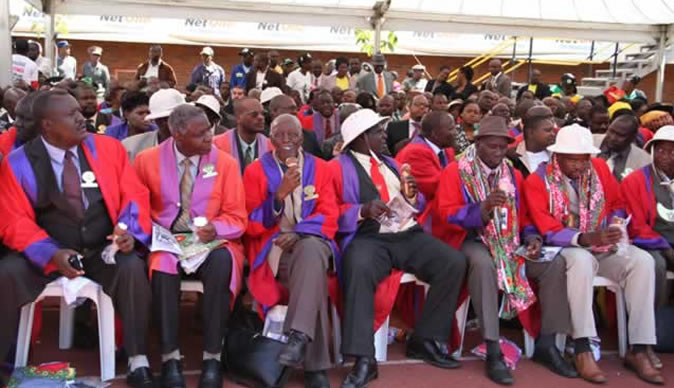


CHIEFS, considered a key pillar in ZANU-PF’s scheme of things, are threatening to boycott their annual conference set for next month if government does not give them brand new cars and farms; raise their allowances and exempt them from paying road user fees by the 30th of this month, the Financial Gazette has learnt.
A report leaked to the Financial Gazette, derived from minutes of a Chief’s Council meetings held in Harare last week, reveals that the traditional leaders, once described by President Robert Mugabe as “paragons of virtue,” are disgruntled by the way government has been handling their affairs which they say is not in tandem with how Members of Parliament are treated.
They have therefore vowed not to attend the annual conference if their grievances are not addressed before the end of this month. According to the report, traditional leaders have also lost confidence in the Minister of Local Government, Public Works and National Housing, Ignatius Chombo, whom they accused of mishandling their issues and are demanding an audience with President Mugabe by August 30.
Chombo’s ministry administers the Traditional Leaders Act, a law which the chiefs want to be aligned to the new Constitution, which gives them more recognition than the old charter. The Traditional Leaders Act defines the status of local government and the role of traditional leaders under customary law. In a recent meeting, the chiefs came up with several resolutions which they want presented to President Mugabe.
These include new vehicles – they say at 10 years old, their current vehicles are now too old; higher allowances from the current US$300 to US$800; and exemption from paying tollgate fees. In addition, the chiefs are also demanding commercial farms. “Many chiefs no longer have vehicles and have since resorted to using buses, bicycles, and in some instances, they walk on foot. Chiefs had a view that they compare with their counterparts, the MPs, but since 2004, it was cited that there was a liquidity crunch yet Parliamentarians got new cars in 2005, 2008 and 2014 despite the same liquidity crunch,” reads part of the report.
“The Chiefs’ Council representatives should meet the President of Zimbabwe before the Chiefs’ Conference is held in September this year to have their car deals finalised so that they have cars. If the government cannot help, the Chiefs should ask for permission to seek for donations so that they can buy cars,” the report continues.
The current Traditional Leaders Act only states that the traditional leaders are entitled to an allowance, which is contrary to Chapter 15 section 284 of the new Constitution which states that ‘an Act of Parliament must provide for the remuneration and benefits of traditional leaders to be fixed with the approval of the President given on the recommendation of the minister responsible for finance after consultation with the minister responsible for traditional leaders.”
In the report, “The Chiefs also observed that constitutionally, they are no longer entitled to allowances but remuneration as stated in Chapter 15 (284) of the new Constitution.” This is not the only time chiefs have agitated for an increase in allowances. In 2008, they proposed an increase to US$560 but that was not honored. Should government fail to honour their demands, the chiefs would rather abandon the conference so that the money budgeted for it could be diverted towards the purchase of cars and payment of US$800 salaries.
The chiefs also resolved that commercial farms should urgently be allocated to all the traditional leaders who did not benefit from the fast track land reform programme in their provinces. They agreed that they should meet with respective provincial ministers and outline their demands. “The Provincial Chiefs Council should recommend at provincial level for Chiefs to be allocated farms and then write to the Chief Secretary in President’s Office onward to the President with identified farms approved by the Minister of Provincial Affairs responsible for the area where there farm is. The meetings (with the provincial ministers) should be held by 20th August 2014,” reads the resolution.
According to the report, the chiefs felt they were being enticed by false promises by politicians during election time when they would be seeking their influence over the people to win support and are not regarded soon after the elections. “The chiefs have not yet been adequately recognized by the government since 2004 although they seem to be recognised only for political expediency during election time,” the report read.
The chiefs also demanded to be provided with new regalia with each chieftainship having its own distinct form since they emanate from different ancestors. Chombo was not answering his mobile phone while his deputy Joel Biggie Matiza was unreachable, when the Financial Gazette called them for a comment.
President of the Chief’s Council Fortune Charumbira could also not be reached by the time of going to press. The ruling ZANU-PF government has operated an intricate patronage system that derives its strength from traditional chiefs, war veterans, youths and women, among other interest groups. While this intricately woven network has ensured ZANU-PF’s survival in the rough and tumble of Zimbabwean politics, it has also exposed the ruling party to extortionate demands from these groupings.
For instance, under the late Chenjerai “Hitler” Hunzvi, the former liberation war fighters were in 1997 given Z$50 000 (which was a lot of money back then) in gratuities each by government after embarking on a series of protests. The unbudgeted payouts that amounted to US$2 000 saw the Zimbabwe dollar losing its value by 70 percent in one day and analysts say the move signaled Zimbabwe’s well documented economic collapse.
Now, 17 years later, the ageing veterans are still arguing that the government was meant to have paid them Z$500 000 each in 1997 but up to date they have not received the balance. Apart from money, they are pressing for diamond mining concessions and parliamentary seats. In May, ZANU-PF youths in Chitungwiza demanded at least three residential stands in each district from Chombo promised to them during the election campaigns last year. The party has 30 districts in the dormitory town.
newsdesk@fingaz.co.zw